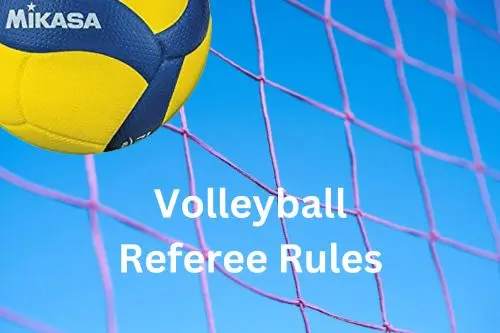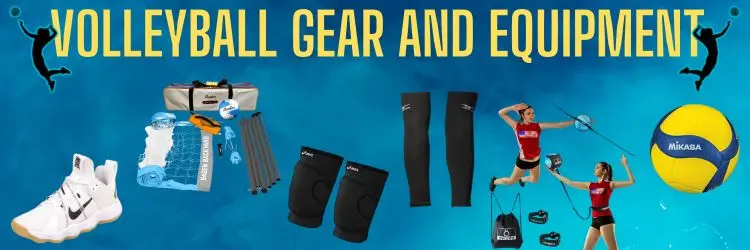Volleyball Referee Rules

Volleyball Referee Rules: Official Duties and Responsibilities
The role of Volleyball officials, especially referees, is crucial in ensuring that the game is played according to the rules and in a spirit of sportsmanship. From professional leagues to recreational matches, officiating provides structure, discipline and clarity to the game. This article provides an overview of the rules, duties and responsibilities of referees and other officials in volleyball.
The Importance of Officiating in Volleyball
Volleyball officiating is not just about making calls during a match—it is about managing the game environment, ensuring player safety, and applying the rules consistently. Good officiating enhances the game experience for players, coaches and spectators by keeping the game fair and flowing smoothly.
Types of Officials in Volleyball
In a standard volleyball match, especially at the competitive or professional level, multiple officials work together as a team. Each has specific duties:
First Referee (R1)
Also known as the head referee, the first referee holds the highest authority on the court. Positioned on a referee stand at the net, they are responsible for overseeing the entire match. Their duties include:
- Signaling the start and end of each rally.
- Making final decisions on rule interpretations.
- Overseeing player positions and rotations.
- Calling faults such as net touches, ball handling errors (e.g. double hits, lifts) and back row attacks.
- Authorizing timeouts and substitutions.
The first referee must remain alert, decisive and impartial. Their body language, whistle and hand signals communicate their decisions clearly to players and spectators.
Second Referee (R2)
The second referee, also known as the umpire, is positioned on the opposite side of the court from the first referee, near the post and at court level. Their main roles include:
- Monitoring net play and centerline violations.
- Assisting with substitutions and ensuring the correct procedure.
- Observing the positions of players before the serve to catch positional faults.
- Communicating with the scorekeeper and managing the official score sheet.
- Overseeing the conduct of coaches and team staff on the bench.
The second referee also supports the first referee by confirming calls, especially those involving net or foot faults and can suggest decisions if requested by the first referee.
Scorer and Assistant Scorer
The scorer is responsible for recording points, substitutions and other game related data on the official score sheet. An assistant scorer, often referred to as the libero tracker, may be assigned to keep track of libero substitutions and ensure compliance with the rules related to this specialized player.
Their duties include:
- Recording each point earned and timeout used.
- Documenting player substitutions accurately.
- Monitoring serving order and alerting officials of rotation errors.
- Tracking the libero’s entries and exits, ensuring proper procedures are followed.
Line Judges
There are usually two or four line judges, depending on the level of play. They assist by observing whether balls land in or out of bounds and if a player touches the ball before it crosses the boundary. Positioned at the corners of the court, their main responsibilities are:
- Indicating the ball’s landing point (in or out).
- Signaling touches off the block or player.
- Watching for foot faults during serves.
Line judges use flags to signal their calls, which must be clear and prompt. Their input is crucial, especially for close line calls that the referees might not be in the best position to see.
Key Rules Officials Enforce
Volleyball officials must be intimately familiar with the rulebook. Some of the key rules they enforce include:
- Scoring and rotation: Ensuring teams serve in the correct order and awarding points appropriately.
- Serving: Watching for foot faults and illegal service techniques.
- Ball handling: Identifying illegal contacts, such as carries or double hits.
- Net play: Determining net violations, such as touching the net or crossing the centerline.
- Player conduct: Managing unsportsmanlike behavior, issuing warnings and applying penalties when necessary.
- Timeouts and substitutions: Regulating the number and timing of team timeouts and substitutions.
Each rule is supported by clear hand signals and officials must be trained to use them correctly.
Pre-Match and Post-Match Duties
Referees and officials have responsibilities beyond what happens during the actual match.
Before the Match:
- Inspecting the playing area, equipment and uniforms to ensure compliance with regulations.
- Conducting the coin toss to determine serving and court side.
- Reviewing the roster and verifying the lineup sheets submitted by each team.
- Ensuring that all officials understand their assignments.
After the Match:
- Confirming the final score.
- Completing and signing the score sheet.
- Submitting reports for any incidents or misconduct.
- Evaluating the performance of the officiating crew (especially in professional settings).
Characteristics of a Good Volleyball Official
Referees and officials must demonstrate several key qualities to be effective:
- Knowledge: A strong understanding of the rules and mechanics of the game.
- Confidence: The ability to make quick decisions and stand by them.
- Communication: Using clear, consistent signals and maintaining calm dialogue with players and coaches.
- Composure: Staying focused and impartial, even under pressure.
- Teamwork: Working seamlessly with other officials to cover all aspects of the match.
Training, certification and regular review of rule updates are also essential to maintaining officiating standards.
Challenges in Officiating Volleyball
Referees face unique challenges in volleyball, including:
- Fast paced rallies that require split second judgments.
- Conflicts with players or coaches disputing a call.
- Limited visibility depending on positioning.
- Dealing with crowd reactions and pressure.
To handle these situations effectively, referees must continuously develop their decision making skills and maintain professionalism.
Conclusion
Officiating in volleyball is a demanding but rewarding responsibility that plays a vital role in the sport’s integrity. Referees and other officials ensure that matches are conducted fairly, smoothly and in accordance with the rules. From managing game flow to handling disputes, their duties require a combination of rule knowledge, situational awareness and interpersonal skills.
Whether at the recreational or professional level, quality officiating is essential for the growth and enjoyment of volleyball. As the sport continues to evolve, so too does the need for well trained, dedicated officials who uphold the values of the game.


